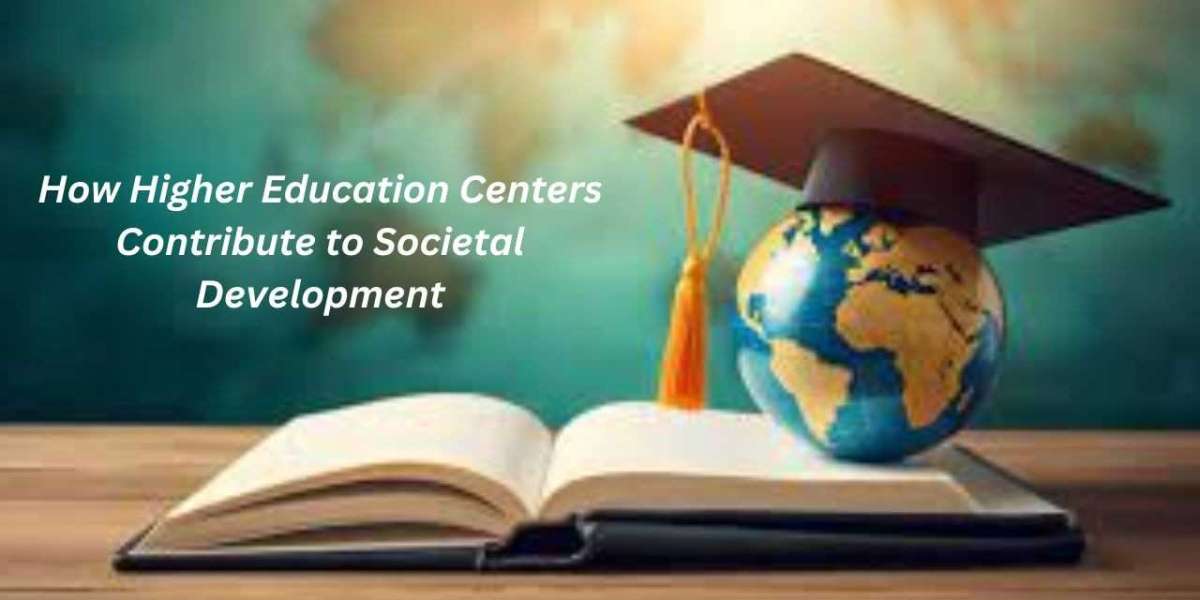Higher education centers play an essential role in the progress and development of society. They serve as the foundation for creating knowledgeable and skilled individuals who can positively impact their communities, the economy, and the world at large. In this article, we will explore how
1. Building a Skilled Workforce
One of the primary ways higher education centers contribute to society is by producing a skilled and educated workforce. Universities, colleges, and other educational institutions offer programs that equip students with the knowledge and practical skills needed in various industries. From healthcare to technology, higher education institutions provide training that prepares graduates to fill important roles in the job market.
A highly skilled workforce is essential for economic growth, as it leads to increased productivity, innovation, and competitiveness. The more educated a society is, the better equipped it is to address challenges and drive progress in sectors like business, engineering, and healthcare.
2. Promoting Social Mobility
Higher education centers provide opportunities for individuals to improve their socioeconomic status. By offering accessible education, these institutions create pathways for people from diverse backgrounds to achieve their career goals. Graduates from higher education centers often have better job prospects, higher earning potential, and improved quality of life.
This promotes social mobility, allowing people to rise above their circumstances and contribute to the community in meaningful ways. Education, in this sense, is a powerful tool for reducing inequality and fostering a more just society.
3. Encouraging Innovation and Research
Innovation is a driving force behind societal development, and higher education centers are hubs for research and creativity. Universities and research institutes provide an environment where new ideas are developed, tested, and refined. This results in breakthroughs in fields like medicine, technology, engineering, and environmental science.
Research conducted at these institutions addresses pressing global challenges, such as climate change, public health crises, and poverty. The findings from academic research not only contribute to new knowledge but also lead to practical solutions that improve the lives of people worldwide.
4. Fostering Civic Engagement and Responsibility
Higher education centers do more than just educate students—they also cultivate a sense of civic responsibility and engagement. Through campus activities, volunteer programs, and community service projects, students are encouraged to become active citizens who are committed to making a difference in their communities.
Educational institutions often focus on developing leadership skills and promoting values like social justice, equality, and environmental sustainability. This helps students understand their role in society and motivates them to work towards positive change, both locally and globally.
5. Driving Economic Development
Higher education institutions are not only centers of learning but also significant contributors to local and national economies. Universities and colleges create jobs for faculty, staff, and administrative personnel. They also attract investments and foster collaboration with businesses, government agencies, and nonprofit organizations.
Moreover, the research and innovation coming out of higher education centers lead to the development of new industries, technologies, and products, further boosting economic growth. Graduates who establish businesses or work in high-level positions also contribute to the economy by generating revenue and creating employment opportunities.
6. Promoting Cultural Understanding and Global Collaboration
As societies become more interconnected, higher education centers foster cultural understanding and global collaboration. Students and faculty from diverse backgrounds come together to share ideas, knowledge, and experiences. This promotes mutual respect and helps bridge cultural divides.
Through international partnerships, exchange programs, and global research initiatives, higher education institutions play a key role in addressing global challenges that require cross-border collaboration. This openness to different perspectives enriches societies and promotes peace, cooperation, and shared progress.
Conclusion
Higher education centers are societal development. They not only equip individuals with the skills and knowledge needed to thrive but also play a significant role in fostering economic growth, innovation, social mobility, and civic engagement. By producing educated, responsible citizens who contribute to both local and global communities, these institutions shape the future of society in profound ways.
1. Building a Skilled Workforce
One of the primary ways higher education centers contribute to society is by producing a skilled and educated workforce. Universities, colleges, and other educational institutions offer programs that equip students with the knowledge and practical skills needed in various industries. From healthcare to technology, higher education institutions provide training that prepares graduates to fill important roles in the job market.
A highly skilled workforce is essential for economic growth, as it leads to increased productivity, innovation, and competitiveness. The more educated a society is, the better equipped it is to address challenges and drive progress in sectors like business, engineering, and healthcare.
2. Promoting Social Mobility
Higher education centers provide opportunities for individuals to improve their socioeconomic status. By offering accessible education, these institutions create pathways for people from diverse backgrounds to achieve their career goals. Graduates from higher education centers often have better job prospects, higher earning potential, and improved quality of life.
This promotes social mobility, allowing people to rise above their circumstances and contribute to the community in meaningful ways. Education, in this sense, is a powerful tool for reducing inequality and fostering a more just society.
3. Encouraging Innovation and Research
Innovation is a driving force behind societal development, and higher education centers are hubs for research and creativity. Universities and research institutes provide an environment where new ideas are developed, tested, and refined. This results in breakthroughs in fields like medicine, technology, engineering, and environmental science.
Research conducted at these institutions addresses pressing global challenges, such as climate change, public health crises, and poverty. The findings from academic research not only contribute to new knowledge but also lead to practical solutions that improve the lives of people worldwide.
4. Fostering Civic Engagement and Responsibility
Higher education centers do more than just educate students—they also cultivate a sense of civic responsibility and engagement. Through campus activities, volunteer programs, and community service projects, students are encouraged to become active citizens who are committed to making a difference in their communities.
Educational institutions often focus on developing leadership skills and promoting values like social justice, equality, and environmental sustainability. This helps students understand their role in society and motivates them to work towards positive change, both locally and globally.
5. Driving Economic Development
Higher education institutions are not only centers of learning but also significant contributors to local and national economies. Universities and colleges create jobs for faculty, staff, and administrative personnel. They also attract investments and foster collaboration with businesses, government agencies, and nonprofit organizations.
Moreover, the research and innovation coming out of higher education centers lead to the development of new industries, technologies, and products, further boosting economic growth. Graduates who establish businesses or work in high-level positions also contribute to the economy by generating revenue and creating employment opportunities.
6. Promoting Cultural Understanding and Global Collaboration
As societies become more interconnected, higher education centers foster cultural understanding and global collaboration. Students and faculty from diverse backgrounds come together to share ideas, knowledge, and experiences. This promotes mutual respect and helps bridge cultural divides.
Through international partnerships, exchange programs, and global research initiatives, higher education institutions play a key role in addressing global challenges that require cross-border collaboration. This openness to different perspectives enriches societies and promotes peace, cooperation, and shared progress.
Conclusion
Higher education centers are societal development. They not only equip individuals with the skills and knowledge needed to thrive but also play a significant role in fostering economic growth, innovation, social mobility, and civic engagement. By producing educated, responsible citizens who contribute to both local and global communities, these institutions shape the future of society in profound ways.








